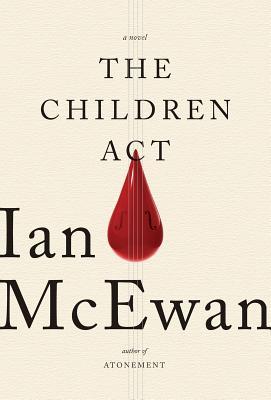Margin Notes: The Children Act
The Children Act
Fiona Maye is a High Court judge in London presiding over cases in family court. She is fiercely intelligent, well respected, and deeply immersed in the nuances of her particular field of law. Often the outcome of a case seems simple from the outside, the course of action to ensure a child's welfare obvious. But the law requires more rigor than mere pragmatism, and Fiona is expert in considering the sensitivities of culture and religion when handing down her verdicts.
But Fiona's professional success belies domestic strife. Her husband, Jack, asks her to consider an open marriage and, after an argument, moves out of their house. His departure leaves her adrift, wondering whether it was not love she had lost so much as a modern form of respectability; whether it was not contempt and ostracism she really fears. She decides to throw herself into her work, especially a complex case involving a seventeen-year-old boy whose parents will not permit a lifesaving blood transfusion because it conflicts with their beliefs as Jehovah's Witnesses. But Jack doesn't leave her thoughts, and the pressure to resolve the case—as well as her crumbling marriage—tests Fiona in ways that will keep readers thoroughly enthralled until the last stunning page.
But Fiona's professional success belies domestic strife. Her husband, Jack, asks her to consider an open marriage and, after an argument, moves out of their house. His departure leaves her adrift, wondering whether it was not love she had lost so much as a modern form of respectability; whether it was not contempt and ostracism she really fears. She decides to throw herself into her work, especially a complex case involving a seventeen-year-old boy whose parents will not permit a lifesaving blood transfusion because it conflicts with their beliefs as Jehovah's Witnesses. But Jack doesn't leave her thoughts, and the pressure to resolve the case—as well as her crumbling marriage—tests Fiona in ways that will keep readers thoroughly enthralled until the last stunning page.
My rating: 4 of 5 stars
This book was beautifully written. Ian McEwan's command of the English language is so beautiful and precise, this book really showcased that and reminded me how beautiful language can be.
We hear the story of a Judge in England's life--her marriage is crumbling and she's adjudicating tricky cases at the same time. She's widely respected and she believes in her ability to make fair decisions. All in all, I sympathized with Fiona. Her husband seems a bit like a loser going through a mid life crisis who needs a kick in the butt. She doesn't have children, yet is a family court judge and deals with family issues all day. It seems like she wanted kids but never made it a priority, and now it's too late, which is sad and understandable and a little lonely. McEwan somehow paints this portrait despite how Fiona portrays herself, since we hear this story from her point of view.
This story felt like a short story. It was a short book, but the story arc felt small, it felt kind of short story-esque. Something baout the structure, the quiet story telling, the portrayal of a moment in someone's life seemed like a short story, which was interesting. It was successful and made me want to explore why it felt so much like a short story.
(view spoiler)
View all my reviews


Comments
Post a Comment